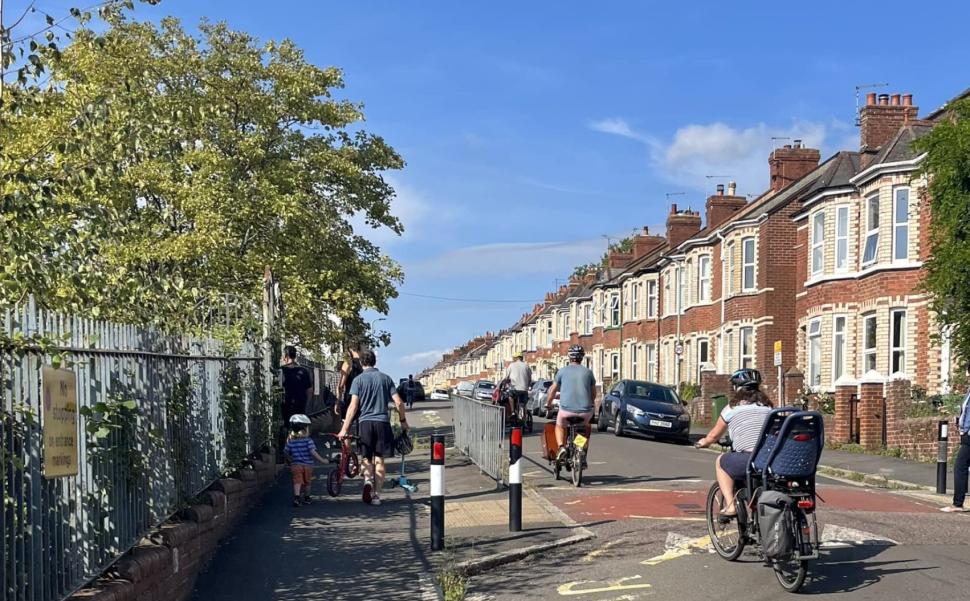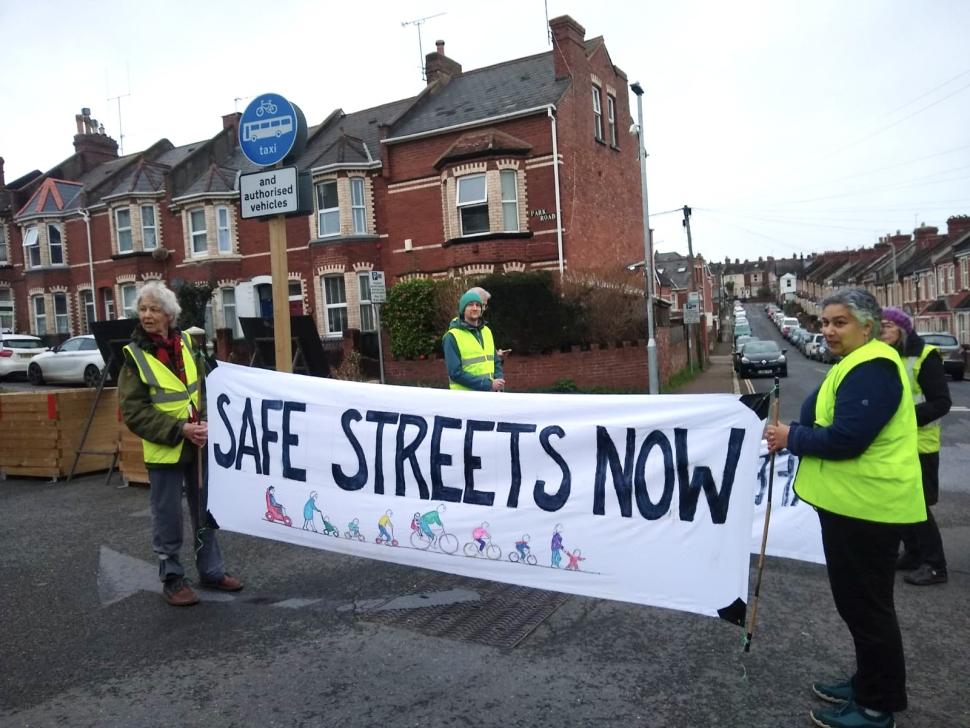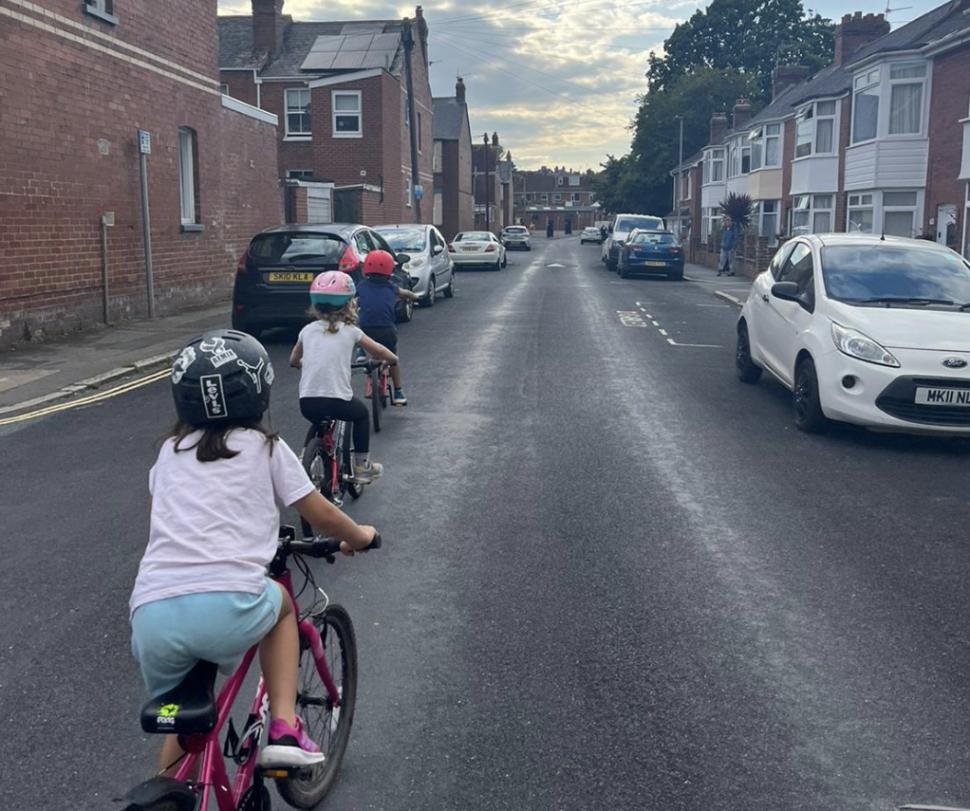- News
- Reviews
- Bikes
- Accessories
- Accessories - misc
- Computer mounts
- Bags
- Bar ends
- Bike bags & cases
- Bottle cages
- Bottles
- Cameras
- Car racks
- Child seats
- Computers
- Glasses
- GPS units
- Helmets
- Lights - front
- Lights - rear
- Lights - sets
- Locks
- Mirrors
- Mudguards
- Racks
- Pumps & CO2 inflators
- Puncture kits
- Reflectives
- Smart watches
- Stands and racks
- Trailers
- Clothing
- Components
- Bar tape & grips
- Bottom brackets
- Brake & gear cables
- Brake & STI levers
- Brake pads & spares
- Brakes
- Cassettes & freewheels
- Chains
- Chainsets & chainrings
- Derailleurs - front
- Derailleurs - rear
- Forks
- Gear levers & shifters
- Groupsets
- Handlebars & extensions
- Headsets
- Hubs
- Inner tubes
- Pedals
- Quick releases & skewers
- Saddles
- Seatposts
- Stems
- Wheels
- Tyres
- Health, fitness and nutrition
- Tools and workshop
- Miscellaneous
- Buyers Guides
- Features
- Forum
- Recommends
- Podcast
 Heavitree and Whipton Active Streets trial, Exeter (Heavitree and Whipton Liveable Neighbourhood Group)
Heavitree and Whipton Active Streets trial, Exeter (Heavitree and Whipton Liveable Neighbourhood Group)Cyclists urge councillors to "take control" and stand by their active travel commitments after report recommends scrapping of divisive low traffic neighbourhood "as soon as possible"
While low traffic neighbourhoods have become the battlegrounds for active travel policies, often drawing up deep, divisive lines ever since the proliferation during the lockdown, there have been few which have piqued passion, dialogue and action as the one in Exeter. After months of vandalism, protests, and intimidation of local politicians, now cyclists are mounting a last resort attempt at saving one by urging the councillors to not abandon their commitments to walking and cycling, with the Tory-led Devon County Council due to meet next week to discuss a report which suggests scrapping the scheme "as soon as possible".
The LTN in question is the Heavitree and Whipton Active Streets Trial, first introduced last August and scheduled for an 18-month consultation, at the end of which the outcomes of the scheme were to be assessed and a decision made.
However, an interim report published in January found that while motor traffic in the area has significantly decreased along with an increase in walking and cycling, it has also resulted in an increase in the journey times and congestion on boundary roads. The report also concluded that unless the LTN began to deliver better results by the end of February, the trial could be abandoned early, with the power to suspend the scheme transferred from the city and county councillors to an unelected official
Now, another report is set to be debated at the next Exeter Highways and Traffic Orders Committee (HATOC) on Monday, June 3, with the recommendation that the trial is “suspended as soon as is practicable”.
An impact assessment carried out by the council showed more than four in five (82 per cent) of the 24,000 responses were opposed to parts of the scheme, with just 18 per cent in favour. A new study has also highlights the project’s ‘disproportionate negative impact’ on people with protected characteristics such as disability and age.
However, Exeter Cycling Campaign claimed that the report betrays council promises, saying the trial has met its aims of boosting ‘active travel’ and reducing car journeys, and councillors are now being put in an ‘invidious’ position by their officers’ report.
"It should not require bravery to cycle to school," the campaign, also a registered road safety charity, said in reference to the fact that one of the traffic filters is located next to the Ladysmith School, where a pupil was knocked off his bike by a driver in February.
A couple of weeks later, fed up by the bus gate violations from drivers, residents stepped in to enforce the closure as "human bollards", the community action coming after two incidents reported involving cyclists being hit by motorists.
Lorna Devenish, the spokesperson for the Heavitree and Whipton Liveable Neighbourhood Group, had said: "The situation outside Ladysmith School has just gone back to being terrible again now. And in fact a child was knocked off their bike and a woman on a cargo bike with a baby on the back was reversed into by a car doing a manoeuvre around the bus gate."
"There was a lot of support; lots of supportive parents and even a supportive taxi driver who stopped to thank us," she said. "There were also some inevitable angry residents and parents as well.
The Exeter Cycling Campaign has now published an open letter to the members of the HATOC, compelling them in a last ditch effort to stand by their active travel commitments and reminding them of all the positive things the Heavitree and Whipton Active Street Trial has achieved.
The campaign wrote: "There are times as a councillor when you have to make difficult decisions and lead. Now is one such time. We urge you to stand firm and do the right thing: keep the Active Streets Trial going."
"Citizens of Exeter have repeatedly endorsed, through consultations and through the ballot box, your policies for building a city which is safe for our children to move freely and safely, a city which is taking climate breakdown seriously and is reducing road harm.
"What a tragedy therefore that you are now being put in the invidious position of receiving recommendations from your Devon County Council (DCC) Officers to reverse the progress we've made in the Active Streets Trial. A trial that is delivering on it's key aims of enabling active travel and reducing car journeys. You really have been let down here.
"It seems incredible that the best solution the DCC team can propose to you is to allow rat-running cars to again drive past Ladysmith schools and to increase car dominance in these areas of Exeter. They have given you no options for mitigating genuine concerns with the trial and are proposing taking us backwards to a situation that citizens, when asked, were unhappy with.
The letter then mentions the achievements of the LTN trial in the nine months so far as overall car journeys being down since pre-trial, with a 30 per cent drop in residential streets, as well as cycling rates going up by 42 per cent. It adds that though boundary road traffic was up by five per cent, it had started decreasing since October.
It also says that the concerns raised by people with disabilities or carers that rely on car travel need adressing, but there are solutions for those concerns which the report had failed to consider.
The letter continued: "The ‘normal’ we had before the trial was not accessible enough for many disabled people. A removal of the trial risks discrimination against young people, older people, some disabled people and lower socio-economic groups, all of whom have no/little access to a car and rely on active/public travel.
"We invite you, as the leaders in our city, to again take control of this trial and instruct your Officers to give a proper assessment of the consultation responses and propose mitigation measures for substantive concerns.
"We urge you to be true to this commitment, to hold firm to our agreed, consulted-on and electorally-endorsed strategies and do the right thing."
Meanwhile, local residents have been divided about the scheme. Liz, a mum told the Exeter Cycling Campaign that the changes to the roads in Heavitree had made her family's journey to the school safer. "It's been great to see other families feel confident to leave the car at home and walk, scoot or cycle to school. The school run feels so much better now," she said.
If children can't walk, cycle or scoot safely to school and around their neighbourhood...if they are driven everywhere...who will be the walkers and cyclists of the future? pic.twitter.com/J3oKUkIevn
— Lorna Devenish (@LKDevenish) May 15, 2024
However, East Devon News reports that other residents have been opposed to the scheme. Gina Wells, an unpaid carer for her husband who has advanced, complex dementia, said that her challenging situation means she can’t leave home for more than an hour.
"I am one of hundreds of unpaid carers living in this city saving the social care budget money, and I want to tell you how much more difficult my life has become because of the low-traffic neighbourhood trial," she said.
In fact, Lucy Haigh, an Independent candidate won the local council elections with an anti-LTN agenda. "I was recently elected in Heavitree ward, as local residents felt they were not being heard, and so I ran as an independent to focus on local issues and the biggest one, without a doubt, is the low traffic neighbourhood," she said.
The scheme has been contentious from the very start. A week after the trial began in the summer, masked youths ripped out the bollards at the entrance to the LTNs before fleeing on bikes, prompting the police to warn that removing such barriers constitutes a criminal offence and that they are monitoring anti-LTN groups on social media.
And in October, protesters sent death threats and filled the letterbox of the local MP’s house with faeces, leading to one man being cautioned by police, while a councillor’s bike tyres were also slashed.
A similar state of events have also been unfolding in South Heaton, Manchester recently, with the councillors opting to scrap a low traffic neighbourhood trial allegedly after succumbing to the pleas of a "few vociferous drivers", despite a majority of residents backing the measure.
Emails exchanged between Manchester City Council's officials also showed them disregarding the residents' support for the LTN as a "concerted response from cyclists", leading to severe backlash from the locals, with one resident even telling road.cc that this incident had convinced him to not vote Labour locally anymore.
As of now, it seems that at least the Green Party councillors are still backing the scheme, with councillors Catherine Rees and Carol Bennett releasing a joint statement saying: "The last set of evidence provided to HATOC showed that the Active Streets Trial had broadly achieved its principle aims of making residential streets safer by reducing traffic and increasing active trial, especially journeys by bicycle, within its boundaries.
"Abandoning the scheme would return Heavitree to the provlems that beset the area before the trial began, such as rat running, speeding and danger to pedestrians and cyclists, especially more vulnerable users. It would mean residents
losing the benefits of calmer, quieter and safer streets.
"Both Councils have an agreed target for 50% of journeys within the city by 2030 to be by walking, cycling or wheeling. This is a crucial target for creating healthier communities, addressing air pollution and cutting carbon emissions. It is hard to see how this can be achieved if initiatives to make streets safer for
active travel are abandoned.
Adwitiya joined road.cc in 2023 as a news writer after graduating with a masters in journalism from Cardiff University. His dissertation focused on active travel, which soon threw him into the deep end of covering everything related to the two-wheeled tool, and now cycling is as big a part of his life as guitars and football. He has previously covered local and national politics for Voice Wales, and also likes to writes about science, tech and the environment, if he can find the time. Living right next to the Taff trail in the Welsh capital, you can find him trying to tackle the brutal climbs in the valleys.
Latest Comments
- Veganpotter 6 hours 51 min ago
It's not too bad. Most just make enough to get by and make people have to accept waiting or a different color. They know people are going to be...
- eburtthebike 7 hours 36 min ago
Indepent drivel: I like it.
- eburtthebike 7 hours 40 min ago
Cycling for mind: Some seriously shit steering there.
- Another_MAMIL 9 hours 16 min ago
I found Velocio Luxe mitts even higher quality than my Assos gloves. (Velocio's Luxe gloves are a step up from the Race mitts reviewed above.)...
- perce 9 hours 50 min ago
Have you been on a train recently?
- chrisonabike 11 hours 1 min ago
I like this sales attitude! Old style UK deprecation. "There are better brands - but try our pedals. Some people like them."...
- HLaB 11 hours 53 min ago
The world's biggest violin, meanwhile I'm playing the world's smallest
- mctrials23 11 hours 58 min ago
You would like to think that 7 might make it a bit harder to ignore but I'm sure there will be a good excuse
- MrE 11 hours 59 min ago
Perhaps he followed the suggested Shimano online anti counterfeit link and saw that Shimano's opening header says "... crackdown in China.."?
- Martynofsheepy 12 hours 23 min ago
Especially the fat ones.



Add new comment
3 comments
This is the usual "OK, we'll let you have your bit of change - but only if it has no impact on us ".
Obviously "it shouldn't make things worse" but the problem is that "longer journey times for drivers" can actually be a desirable, positive outcome (encourages less driving). Because the problem this is addressing is ultimately "too many people driving too many journeys".
Same with "but congestion" - but the other detail here is "traffic evaporation" is real. People adjust and there is almost always elasticity and flexibility in the transport system and people's transport wants.
BUT if you ditch a trial too soon you don't see that happen. The story will almost always be that of the "hard-pressed motorist" - "we tried, but it got worse (for *those driving cars* - mostly because non-residents) so we had to scrap it fast. LTNs don't work in practice".
There's a mistake in the article. South Heaton is in Newcastle. There was an active neighbourhood in Withington South Manchester, that was recently removed.
Militant motorists and pressure groups again - they believe in their self-given right to drive /park when they like, where they like and decide how fast to drive - what they do adversely affects the people outside their cars, but is of no importance to them.